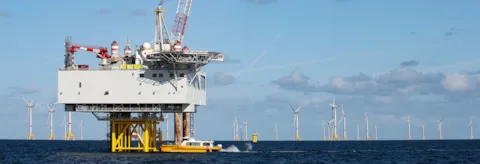DNV proposes revised risk management framework for UK offshore renewables industry, built on oil and gas best practice
DNV has released a comprehensive study comparing major accident risks and risk management practices in the UK between the offshore oil and gas and the offshore renewables industries. The study highlights the need for a revised approach to managing major accident hazards in offshore renewables as the UK advances toward net-zero emissions.
The study Offshore renewables risk management - A pragmatic safety case reveals that while the offshore renewables industry has not yet experienced a defining major accident, incident rates are on the rise. This trend underscores the need for improved risk management strategies, particularly as historical oil and gas accidents provide valuable insights and lessons that have not been fully integrated into the renewables sector.
As incidents become more frequent and their potential severity increases, the offshore renewables sector must adopt a more proactive and structured approach to safety. DNV has long been at the forefront of offshore safety, and while the safety case framework is well-established in oil and gas, its tailored application to renewables marks a meaningful shift. Offshore renewables risks mirror many of those in oil and gas, but are managed differently. The proposed framework offers a pragmatic path for the sector to strengthen its safety culture and better prevent future major accidents.
According to DNV’s Energy Transition Outlook Report UK 2025 offshore wind capacity will significantly increase from around 14 GW today to 90 GW in 2050 (including 10 GW of off-grid capacity for hydrogen production). This will increasingly include floating offshore wind facilities, which will be 24% of total offshore wind capacity by 2050. This forecast confirms the growing need to address major accident risk management for offshore renewables over the coming years.
DNV’s study highlights that the regulatory framework for offshore oil and gas is defined by stringent safety case regulations, developed in response to catastrophic events such as Piper Alpha and Deepwater Horizon. In contrast, offshore renewables is currently governed by broader legislation, the Construction (Design and Management) Regulations, which do not specifically address major accident hazards.
The study also reveals that existing guidance in the renewables industry tends to focus on occupational safety, often without addressing the risks associated with major accidents. Nonetheless, established risk management practices from the oil and gas industry offer a strong foundation that can be adapted to suit the unique challenges of offshore renewables.
Finally, to address these gaps, DNV has proposed a tailored safety case approach for offshore renewables. This framework incorporates hazard identification, risk assessment, and risk management, aiming to provide a clear and comprehensive method to communicate risk strategies to both the workforce and stakeholders.

Hari Vamadevan, Senior Vice President and Regional Director for the UK and Ireland, Energy Systems at DNV, emphasized the importance of this initiative: "As offshore renewables projects increase in number, scale, and complexity, research shows that accident and injury rates are also increasing. The interaction of complex systems is another source of potential new risks.
“Regulation in the oil and gas industry requires identification and management of major accident risk, but there is no mandated need for this in offshore renewables. This study compares major accident risk and risk management in the two industries and proposes a common risk management approach.”

David Dimelow, Principal Engineer and Lead Author, Energy Systems at DNV concluded that “This study compares, and differentiates between, offshore renewables and offshore oil and gas in terms of the major accident potential, guiding legislation, and risk management guidance available in each industry. Our proposal is the adoption of a fit-for-purpose safety case approach for offshore renewables, so that operators can better understand and manage their major accident risk. While currently focused on the UK, a robust risk management approach can readily be applied across different industries and globally.”
